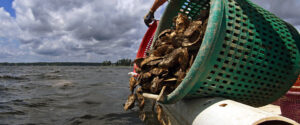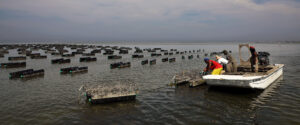Knauss fellow delves into water-powered science policy
Renewable water power can take many forms, from hydroelectric dams to devices that capture energy from ocean tides or currents. As a Knauss fellow in the US Department of Energy’s Water Power Technologies Office, Charles Scaife focused on two main areas: the hydropower program, and the marine energy program.
The Waves to Water Prize, a competition administered by Scaife’s host office, offers cash prizes for new, wave-powered technologies that turn saltwater into drinking water. The competition is one of the Department of Energy’s prizes designed to spur innovation in renewable energy. Compared to hydropower, which creates almost 40 percent of renewable energy in the U.S. in 2019, technologies that harness marine energy are still in very early stages of development.
In the summer of 2019, more than 50 teams proposed concepts for a wave-powered device that can desalinate water. Scaife supported stages of the competition, where teams created a detailed system design and adapted their designs for a specific testing site. Next spring, 10 finalists will test their prototype devices that could be scaled for disaster relief efforts or to provide remote communities with access to fresh water.
“In a disaster-relief scenario, you want something you can deploy quickly, cheaply, and if it breaks, you can replace a part easily,” Scaife said. “[The Waves to Water Prize] challenges competitors to be really creative and to use materials that may be different. That’s been the most surprising part — just seeing how resourceful and challenging it is to create these new inventions.”
As a Knauss fellow, Scaife created new partnership and sponsorship opportunities for different stages of the competition, which hadn’t been done for Department of Energy prizes before. He also supported the Waves to Water Prize by developing documents for the different competition stages.
During the fellowship, Scaife found ways to apply his academic expertise in hydrology as a Ph.D. student to topics within his host office and think about his research in different ways. His research at the University of Virginia focuses on how climate change affects water resources in forests.
“Hydropower requires streams to be flowing reliably to generate power, but if we don’t know the impact of climate on the land surface and water cycle, then we can’t fully understand the impacts it will have on our energy production,” Scaife said.
Unlike his graduate research, which focused on a single topic, Scaife said the fellowship allowed him to work on an interdisciplinary team to address a range of complex problems in hydropower, whether for a specific research projects or interagency efforts. Although Scaife’s research focuses on freshwater hydrology — mountains and the water cycle — rather than marine science, he was able to connect his academic focus to projects in the office and explore the many projects going on within his host office.
“I came in with an interest more related to hydropower because of my background, and my office really gave me the freedom to poke around and find things that really interest me,” Scaife said. “That’s been one of my favorite things, the unending support of my mentors and from other people in the office.”
Scaife found ways to apply his academic expertise in hydrology as a Ph.D. student to topics within his host office and think about his research in different ways.
Scaife helped brief leaders about the office’s research portfolio during the transition between presidential administrations.
In a given week, Scaife helped communicate results from specific projects, like assessing methane emissions from reservoirs or modeling changes in streamflow, while also summarizing the broader strategies that link individual projects to meet larger goals.
During the second half of his fellowship, Scaife helped brief leaders about the office’s research portfolio during the transition between presidential administrations. He also helped coordinate an interagency agreement for hydropower research between the Bureau of Reclamation, the Army Corps of Engineers, and the Department of Energy.
After taking time to complete his Ph.D. in environmental science at the University of Virginia, Scaife will continue working with the Department of Energy’s Water Power Technologies Office as an ORISE fellow.
“I really anticipate exploring how climate impacts touch on every bit of our program,” Scaife said. “I’m hoping to be part of those conversations in really impactful ways. I’m also hoping that’s what I can focus on — pulling my expertise into this new world.”
Takeaways:
- As a Knauss fellow in the US Department of Energy’s Water Power Technologies Office, Charles Scaife focused on two main areas: the hydropower program, and the marine energy program.
- He supported the Waves to Water Prize, a competition for wave-powered technologies that turn saltwater into drinking water, and created new sponsorship opportunities for the prize.
- After completing his Ph.D. in environmental science at the University of Virginia, Scaife will continue working with the Department of Energy’s Water Power Technologies Office as an ORISE fellow.
Contributed photos by The Bureau of Reclamation
Photos and Video by Aileen Devlin | Virginia Sea Grant
Published February 25, 2021.
After taking time to complete his Ph.D. in environmental science at the University of Virginia, Scaife will continue working with the Department of Energy’s Water Power Technologies Office as an ORISE fellow.





